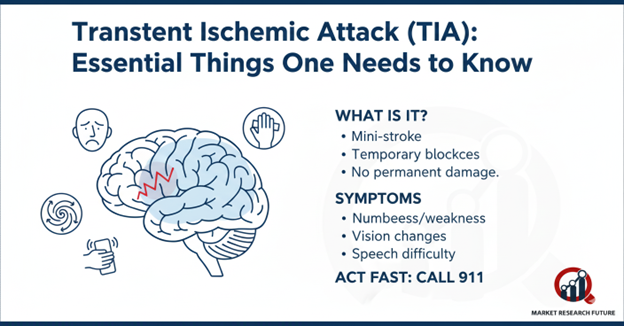Transient Ischemic Attack: Essential Things One Needs to Know

Transient Ischemic Attack Overview
A Transient Ischemic Attack (TIA), often referred to as a “mini-stroke” or “warning stroke,” occurs when the brain’s blood supply is temporarily interrupted. Unlike a full stroke, a TIA does not cause permanent brain damage, but it serves as a critical warning sign of potential future strokes. Understanding its causes, symptoms, risk factors, and preventive measures is essential, as timely medical attention can significantly reduce the risk of long-term neurological complications.
TIAs can last from a few minutes to 24 hours, and though symptoms often resolve on their own, they must never be ignored. Medical experts view TIAs as precursors to major cerebrovascular events, highlighting the importance of early detection and intervention.
What Is a Transient Ischemic Attack?
A TIA occurs when a temporary blockage—often caused by a small blood clot or fatty plaque—disrupts blood flow to the brain. The brain cells are deprived of oxygen for a short duration, resulting in stroke-like symptoms that fade once the blockage clears. While recovery is usually complete, the episode indicates underlying vascular issues that need urgent medical evaluation.
The physiological mechanism involves:
- Formation of tiny clots or emboli in the carotid or cerebral arteries
- Reduced blood flow (ischemia) to certain brain regions
- Temporary neurological deficits, such as speech or motor impairment
Unlike a stroke, the blockage in TIA does not cause tissue death, but recurrent episodes may increase the likelihood of ischemic stroke in the future.
Common Symptoms of TIA
Symptoms vary depending on the part of the brain affected and typically appear suddenly. Key indicators include:
- Motor disturbances: weakness, clumsiness, or hemiparesis (partial paralysis)
- Sensory symptoms: numbness, tingling, or loss of sensation
- Speech and language issues: slurred speech (dysarthria) or difficulty understanding language (aphasia)
- Visual disturbances: blurred or double vision, temporary vision loss
- Balance and coordination issues: dizziness, unsteady walking
- Cognitive confusion: difficulty focusing or understanding simple commands
In most cases, symptoms resolve within minutes or hours, but their recurrence signals a need for immediate medical diagnosis.
Causes and Risk Factors
TIAs can arise from various vascular and lifestyle-related factors that restrict cerebral blood flow. Common causes include:
- Atherosclerosis: narrowing of arteries due to fatty deposits
- Embolism: traveling clots from the heart or carotid arteries
- Hypertension (high blood pressure)
- Diabetes and high cholesterol
- Smoking and alcohol consumption
- Obesity and physical inactivity
Individuals with cardiovascular disease, atrial fibrillation, or carotid artery disease are particularly vulnerable. Additionally, age, genetics, and poor diet amplify the risk of TIA and subsequent strokes.
Classification of TIAs
Medical research classifies TIAs into several types based on their origin and vascular territory:
- Embolic TIA: Caused by clots traveling from another part of the body to the brain.
- Crescendo TIA: Multiple, frequent TIAs occurring in a short time, signalling high stroke risk.
- Hemispheric (territorial) TIA: Occurs in one side of the brain, affecting movement or speech.
- Local Factor-Induced TIA: Triggered by conditions like migraine or vascular spasms.
Proper classification assists neurologists in determining treatment and prevention strategies.
Diagnosis and Treatment
Prompt diagnosis is vital. Common diagnostic procedures include:
- CT or MRI scans to detect brain abnormalities
- Carotid ultrasound to evaluate arterial narrowing
- Blood tests for cholesterol, glucose, and clotting factors
- Electrocardiogram (ECG) to identify cardiac causes of emboli
Treatment and management focus on preventing recurrence:
- Medication: Antiplatelets (aspirin, clopidogrel) and anticoagulants
- Lifestyle changes: Regular exercise, balanced diet, quitting smoking
- Surgery: Carotid endarterectomy or stenting in severe arterial blockages
Preventive Measures and Outlook
The outlook for TIA patients is highly positive with timely intervention. Preventive strategies focus on controlling risk factors—such as hypertension, diabetes, and cholesterol levels—through lifestyle modification and medication adherence.
Public health education emphasizing stroke warning signs (FAST: Face drooping, Arm weakness, Speech difficulty, Time to call emergency) can save lives and reduce long-term disabilities.
Early recognition and management not only prevent full-blown strokes but also contribute to better neurological health and quality of life.
Conclusion
A Transient Ischemic Attack is more than a brief medical episode—it’s a warning that demands action. Recognizing symptoms early and seeking medical help can drastically reduce the risk of stroke and permanent brain damage. With rising awareness, improved diagnostics, and preventive healthcare initiatives, TIAs can be effectively managed, helping millions maintain a healthy, active life.
About Market Research Future (MRFR)
Market Research Future (MRFR) is a globally trusted market intelligence firm dedicated to delivering accurate, data-driven, and actionable insights across diverse industries. With a focus on healthcare innovation, clinical research, and emerging medical technologies, MRFR empowers businesses, investors, and policymakers to make informed decisions. Guided by principles of accuracy, transparency, and client satisfaction, MRFR continues to shape the future of evidence-based market analysis and global healthcare research.

Leave a Comment